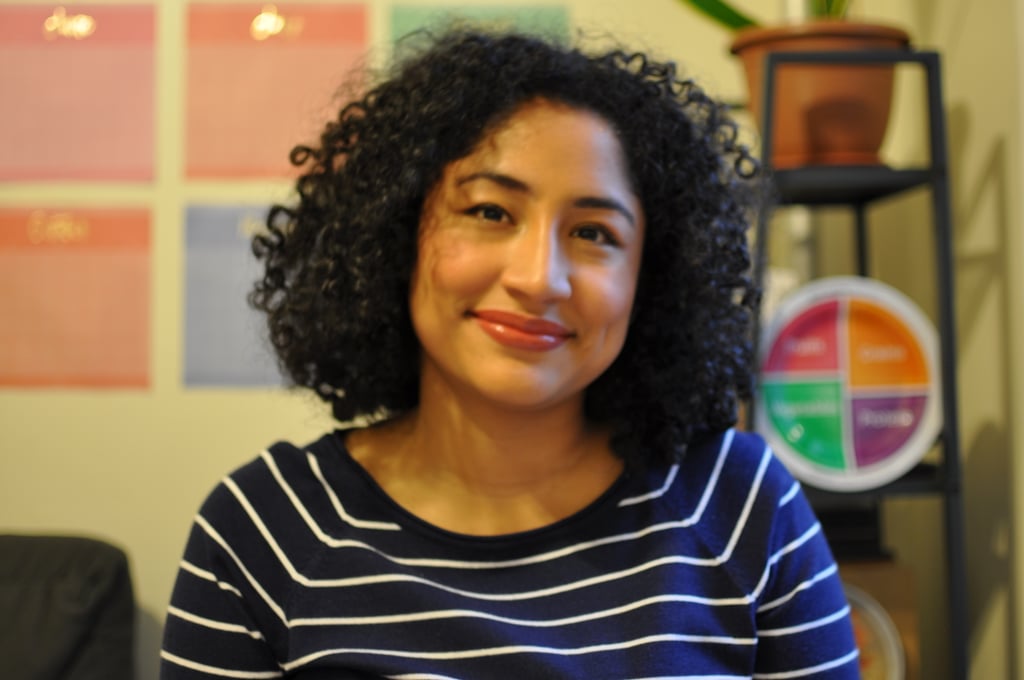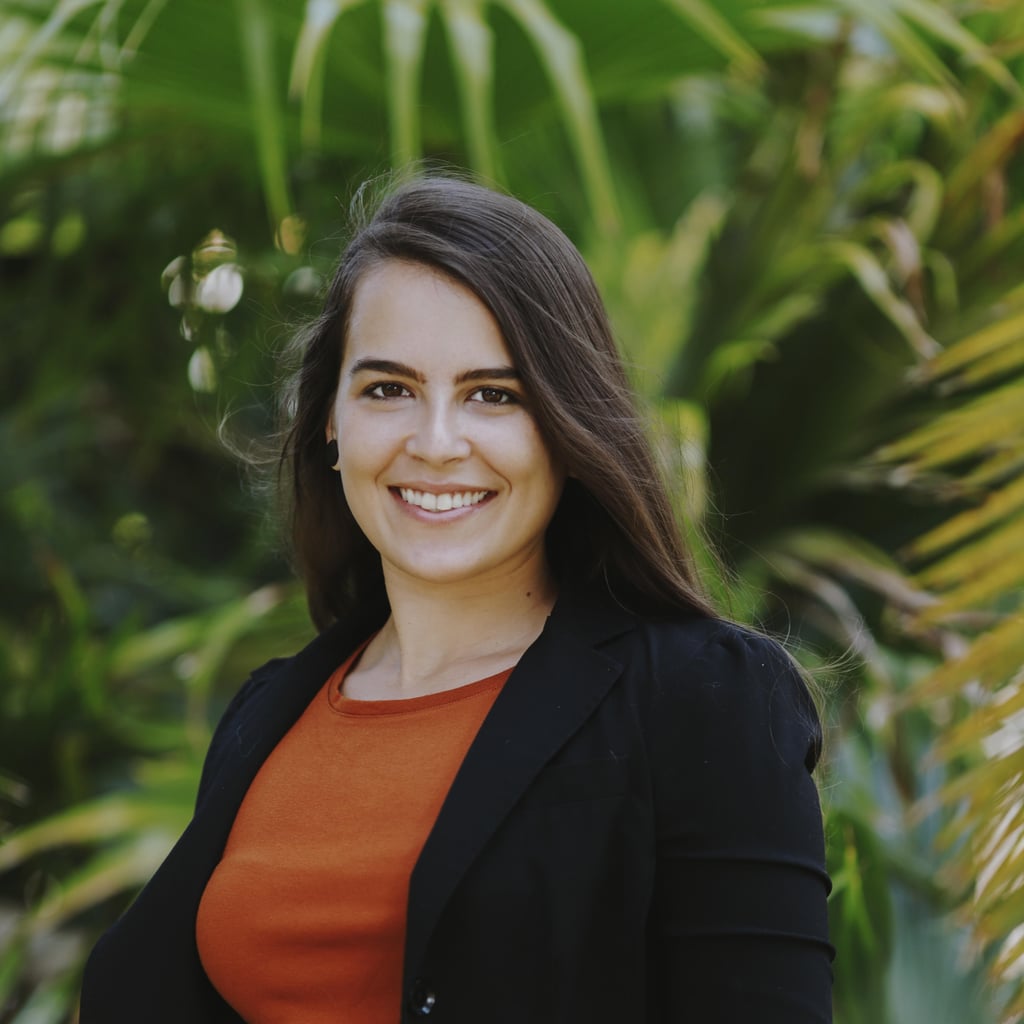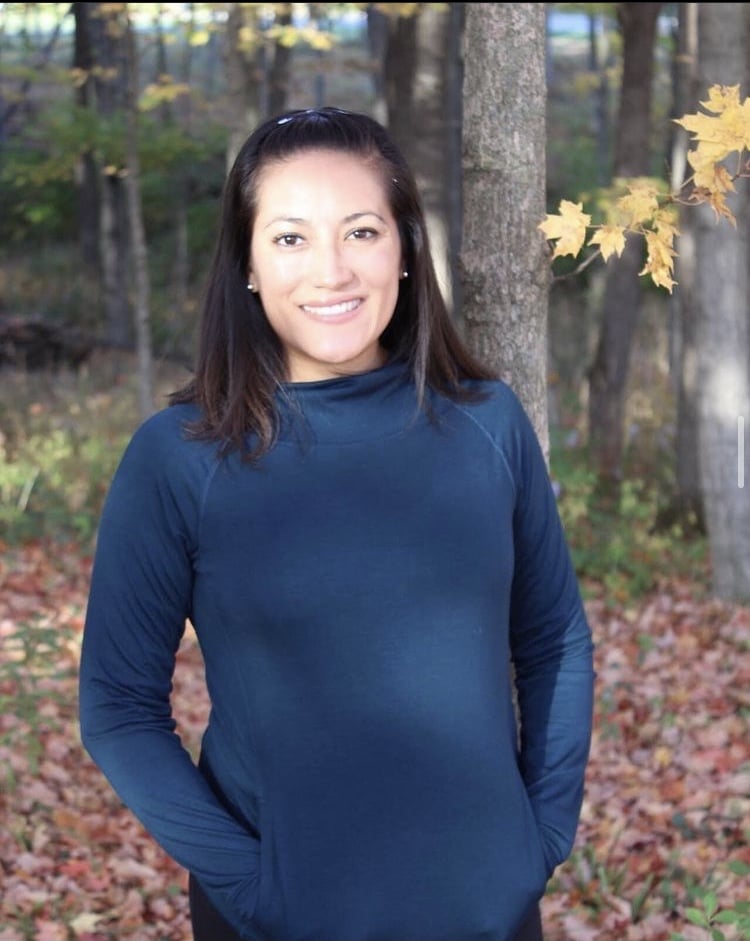Far too many of us who grew up in Latinx households received unsolicited and unwarranted comments about our weight. If you weren't being shamed for being gordita, you were told you were too flaca and needed to eat more (but not too much). Ultimately, though, the message was unequivocal: nothing is worse than being gorda, so all our energies must be used to forestall that fate and lose weight if we didn't succeed. Dieting was our religion [1], the gospel we thought we must heed — and it was nearly impossible not to. Whether you learned about dieting from your mami, tia, or abuela, it's likely your loved ones partook in fad dieting at some point. Unfortunately, this mindset can cause an unhealthy relationship with food and put you at risk for disordered eating [2]. It can also put you in a yo-yo dieting spiral that makes the dieting cycle never-ending and unsustainable.
Research shows that clinicians are less likely to recognize disordered eating behaviors in women of color [3]. But studies also show that exposure to mainstream American culture influences Latinas in the US who are struggling with disordered eating behaviors. This makes sense, considering that the US still promotes white, thin women as the ideal standard of beauty.
Throw in the way modern wellness has called many of our culture's traditional foods 'unhealthy,' while also appropriating many of our other foods, such as chia, quinoa, and açai, and marketing them as 'superfoods,' and it's no surprise that many people are misinformed [4] and confused. Luckily, between the body-positivity movement [5] and health pros speaking up against fad dieting, we are slowly but surely moving in the right direction. Latinx nutritionists and dietitians also have growing audiences on Instagram, and they're using their platforms to speak to their Latinx followers and to fight against toxic diet culture myths. Check out some of our favorite experts dispelling dieting myths one post at a time.
Dalina Soto, MA, RD, LDN

The expert: You've probably come across Dalina Soto's IG account when looking for Latinx health experts to follow. The Dominicana is well known for taking an anti-diet stance, and she specifically helps Latinas end chronic dieting, eliminate food guilt, and embrace their culture. Soto's path to becoming a registered dietitian started when she was in college. "I took a nutrition class during my undergrad and fell in love with the preventative care side of things," she tells POPSUGAR Latina. "Little did she know it would lead to the huge following she has now on her Instagram page where she strives to educate her followers on the importance of being their healthiest selves without the food restrictions.
Her anti-diet philosophy: Soto says her approach to educating her clients comes from a science-based perspective using data from nutritional sciences. "I work from a weight-neutral perspective, which means I work on finding health outside of a number on a scale and holistically," she explains. In addition to this strategy, she also works on their physical and mental health, aiming to eliminate the fear of food, inspiring them to cook more, eat more veggies, and work out to feel good, energized, and strong. "I want them to walk away with all my knowledge so that they never fear food again and can use the tools I teach them through all life cycles." Soto dispels one of the worst dieting myths she's heard over and over again by clients. " The worst dieting myth is that sugar in all forms is bad, which leads to people avoiding fruit, which is so nutritious over the fear of sugar," she says, adding, "Yes, there are many types of sugar, no they aren't bad. But we need to learn how they work in the body and the differences without fearing them."
Fighting food shaming: Soto does her best to explain to clients that there is no such thing as good or bad foods—this includes popular traditional Latinx foods. "When you compare side by side, you see our dishes provide us with proper nutrition and often more, " she says. She uses rice and beans and tacos as an example because they contain lean protein along with carbs and other nutrients, which make them a complete meal. "I literally show them [clients] the facts, break down food individually and talk about nutrition by using techniques I use to teach children," Soto explains. She further elaborates and says, "I use fun tips and analogies that help translate science into easy ways to understand because people just want to understand how food works in the body, and that alone can make a huge difference."
As for mainstream nutrition appropriating Latinx traditional foods, she says it's part of their tactic to make a profit. "The wellness world picks and chooses what they want to promote as exotic or a superfood, like chia and quinoa, and clings to them to sell them more expensive and as a cure for all or magic answer to health," she explains, concluding that it's simply another form of gentrification.
Where to follow her: @your.latina.nutritionist [6]
Astrid Naranjo, RDN, MS in Nutrition and Dietetics

The expert: The Venezuelan-born RD based out of Australia specializes in diet design for metabolic syndrome, women's health and polycystic ovary syndrome (PCOS), fat loss, binge eating, and creating a healthier relationship with food and overall well-being. Naranjo has been involved in the fitness industry since she was 12, but her all-or-nothing mentality at the time and being in this environment enabled an eating disorder, which got worse while she studied nutrition in college. Upon graduating and having already made a name for herself in Venezuela, Naranjo knew it was time for a change figuratively and literally. "When I moved to Australia I knew I was starting from scratch because I was a stranger there, and that external pressure was no longer there for me to look a certain way," she explains. "I started to reflect and started to understand the root of why I wanted to look a certain way and realized I had to change my mindset." Instead of being admired for her physique, she decided she wanted clients to turn to her as an expert who provides educational and valuable information.
Her anti-diet philosophy: "I am anti-dieting, but I am not anti–weight loss as long as there is purpose behind it," explains Naranjo. She says, "If you are a good health professional you can support clients in their fat-loss journey by educating them, working on behavior change, and having a better relationship with food and their body." She points out that desiring weight loss or changing your body composition doesn't automatically mean that you need to "go on a diet." Instead, she aims to teach basic nutritional tools and uses basic dietary guidelines with her clients.
"I teach my clients how to stop fearing foods, to incorporate all foods in their diet, and still keep their weight loss goals as long as they're appropriate, realistic, and achievable." She also asks clients the hard questions and helps them get rid of the restrictive mindset and to have neutral respect for their bodies. "A lot of people don't understand why they want to lose weight in the first place," says Naranjo. "They also let their weight tie into their identity, so once I help them work through this mental block, we move away from numbers and focus on a more intentional and informed approach to eating," she elaborates, adding, "There is no one right way to do things, and it's about learning the why behind your habits, and what is sustainable for you."
Fighting food shaming: Naranjo is against the 'good' versus 'bad' foods mentality. "All foods can fit into your diet! Food is not 'bad' and when you call it this, you give food all the power when you try to restrict it," she says. Instead, she believes you take the power back by stopping the fear and restriction of food, and learning how to incorporate all the foods you enjoy. She insists you don't have to 'eat clean' or be strict to see progress. "There are foods that have more sugar, fat, & calories, but that doesn't mean you can never eat them," she clarifies, adding, "It just means you have to eat a smaller portion size, play with your calorie budget, or, have them less often, and pair them with some nutrient-dense foods for balance."
Where to follow her: @antidiet_dietitian [7], @tucoach.nutricional [8]
Alice Figueroa Nuñez, MPH, RDN, CDN, Natural Food Chef, Founder of The Mindful Nutrition Center

The expert: Figueroa, who is of Guatemalan descent, is an advocate for human rights and universal access to nutrition support, health services, and wholesome foods for all segments of society. "I've conducted nutrition research and policy development in Guatemala to address child malnutrition in indigenous Mayan communities," she says. Having witnessed firsthand how children in Mexico and Guatemala lack food, education, and clean water, Figueroa was inspired to pursue a career that would allow her to bring health services and food security to underserved populations. She's also spent most of her career providing nutrition services in Harlem and the Bronx for BIPOC communities.
Her anti-diet philosophy: "We grew up in a society that idolizes weight loss and that convinced us that there is something wrong with our bodies' shapes and sizes that needs to be fixed," she explains. As a result, it's the norm for most people to have weight-loss thoughts and desires. "Diet culture is defined by harmful, unrealistic expectations to lose weight or to eat a perfect diet that requires a person to restrict foods in a way that triggers disordered eating and engag[ing] in behavior that is harmful to mental wellness, physical health, and body image," Figueroa elaborates.
Some of these behaviors include: moralizing food as good or bad, restricting food groups (which may lead to binging), excessive exercise to compensate for eating, comparison to others in before and after pictures, taking unproven supplements for weight loss, fasting, wearing waist trainers, and even editing pictures to look thinner. "My nutrition philosophy is not focused on weight loss or restriction, but it champions adding nutritious, diverse foods to your meals while honoring your food preferences and culture, listening to your hunger and fullness cues," states Figueroa. She also believes in empowering clients to find forms of exercise that they enjoy, and practicing stress reduction and mindfulness techniques.
Fighting food shaming: "It is important to honor the diversity and richness of Latinx culture, and to recognize that while Latinx share many cultural traditions, societal values, food preferences, and family structures, we are also a very diverse community," Nuñez points out. She embraces the differences of each Latin American country and acknowledges that each group has its own set of health values and traditions. She says this is an essential step in providing culturally humble nutrition and health support.
"One of my missions is to advocate against cultural appropriation of Latinx food and racist rhetoric toward Latin American food traditions," she explains. For example, she points out how offensive it is when people in the wellness or food industry say that they are going to healthify a Guatemalan dish, elevate a Dominican dish, or make 'clean' Mexican food.
"Latinx food is health-supportive, clean, sophisticated, and not dirty! With my clients and readers, I take the time to bust wellness myths that shame our food traditions," she says pointing out that many of the foods that are admired by the "modern wellness" industry are Latin American. Foods such as chia seeds, avocado, moringa, quinoa, cacao, amaranth, tortillas, arepas, plantains, and empanadas are delicious, nutritious, and native to Latinx cultures. With this in mind, she affirms that there is no one-size-fits-all approach to nutrition. We can create balanced, satisfying meals that fulfill our physical, mental, and emotional needs by eating food that is traditional to our culture," she adds.
Where to follow her: @aliceinfoodieland [9]
Fadhylla Saballos, MPH, RD, CDN, IBCLC

Meet the expert: Saballos discovered nutrition through an elective course while in college. "The more I learned about nutrition, the more fascinated I was with how it could impact people's health for better or worse," she says. This encouraged her to become a dietitian who could provide support without judgment of Latinx cultural foods.
Her anti-diet philosophy: Saballos says in order to fight diet culture one has to first be aware of what diet culture is and how it presents itself in everyday life. "One of the key elements of my counseling is helping clients let go of these myths that they have learned over the years," she explains. This is because it can manifest in parents projecting their fears, misconceptions, and trauma around food onto their children.
"The worst dieting myth I try to help my clients overcome is that children need to be on a diet for weight loss or weight gain," she says. Saballos elaborates how our obsession with being "a certain size" is a disservice to those that listen to their hunger and satiety cues and eat until they're comfortably full. "When we teach children to eat more than they want — as in finishing everything on their plate, rewarding them with a certain food, and/or restricting their eating, we teach them to ignore their hunger or fullness cues and create an unpleasant experience around food," she says. This can have serious long-term effects, such as feeling shame, hiding foods, and disordered eating.
Fighting food shaming: Saballos, who is of Nicaraguan descent, makes it a point to highlight that many traditional Latinx foods are nutritious. "I use a lot of examples with my clients to remind them of foods that they might have grown up eating and are now considered "superfoods," such as quinoa, chia, flaxseeds," she says. Saballos also highlights the complexity and nourishment our traditional foods have provided and tries to put it in the context of colonization and exploitation our communities have survived. "We live in a society that expects us to work nonstop, which can make us skip meals, sleep less, and feel like we don't have time for ourselves," she says adding that she encourages clients to understand the need to take care of themselves by teaching them to see self-care with a lens of abundance instead of restriction. This includes more meals, more fruits, more vegetables, more movement, and more sleep.
Where to follow her: @Latinxrd [10]
Diana Mesa, RD, LDN, Owner of En La Mesa Nutrition

Meet the expert: Mesa became a dietitian because she loved everything about food and enjoys helping people. "I was in the food service industry for over a decade and it just made sense to transition into a career where food and health intersect," she says. Throughout her years of experience, she has educated medical professionals, adults, and children on how to cook and enjoy a healthy lifestyle without sacrificing flavor. The bilingual Cubana is based out of Miami, Florida, and runs her own nutrition and wellness business known as En La Mesa Nutrition.
Her anti-diet philosophy: "It takes a lot of unlearning what diet culture has done to us to break through and really get in touch with what our bodies need," she says. In her care, clients don't receive a meal plan or a list of "good" and "bad" foods. Instead, she has an "all foods fit" approach and says her goal is to guide them through their journey of reconnecting to intuitive and mindful eating, while equipping them with the knowledge they need to combat nutrition misinformation. "I encourage them to add foods in instead of taking foods out because I want them to know that they can enjoy their rice and beans and STILL honor their health," she discloses. One example of a dieting myth she comes across a lot is the idea that fat is bad and should be avoided at all times. She points out, "Fat is an essential component of our diet that can be found in avocados, olives, fatty fish, nuts, and seeds, and is needed in order to absorb vitamins, fight inflammation, have better cognition, and hormonal balance."
Fighting food shaming: "Most of my clients are Latinxs, like myself, and our foods have a horrible reputation for being 'unhealthy,'" she says. Mesa explains that modern wellness presents our traditional foods as too greasy or too starchy. "I combat this misinformation by educating on how nutritious our foods are," she elaborates, stating how beans, for example, are fiber-dense and rich in folate, iron, and protein. "I also highlight the fact that we ultimately decide which cooking preparation is best to honor our health, and we are in control of our portion sizes, so there is nothing inherently 'unhealthy' about our foods," she adds. Ultimately she wants to show that we can enjoy our cultural foods as well as a balanced diet without adding shame to it.
Where to follow her: @enlamesanutrition [11]
Alma Simmons, RDN, LD

Meet the expert: The Mexican-American expert says she has always had a passion for food and loves the field of healthcare. "I wanted a profession that could combine those two passions of mine and put them into practice, "she says. "I very much enjoy helping people break free from fad diets and reclaim their physical and mental health with lifestyle nutrition."
Her anti-diet philosophy: Simmons says when it comes to weight loss it is important to know that weight loss alone, without learning how to have a balanced lifestyle, is equivalent to putting adhesive bandages on broken bones. "Sustainable weight loss only comes as a side effect of healthy eating and lifestyle habits, which is very hard for people to understand because it doesn't happen overnight, or in a few weeks, or even months," she explains. Simmons adds that because we live in a society that is so used to quick fixes, it does not fix the root cause of the problem. "The worst dieting advice I've come across actually comes from celebrities and other famous doctors who bestow fear upon vulnerable people," she discloses.
She says most of these diets are detrimental to physical and mental health in the long run. She also warns that weight loss should not be tied to your self-image or self-esteem because the consequences will be destructive. However, if people do want to or need to lose weight, she advises it should be done through the right tools and knowledge to improve their body composition without a numeric "weight goal," but rather where they feel happy and full of energy without the misery of restrictive fad diets. "I fight 'diet culture' in my practice by using a personalized but flexible approach to help my clients master lifestyle nutrition and mindful eating so they can enjoy the food they love and feel great in their own bodies," Simmons says.
Fighting food shaming: Simmons believes it's important to maintain food traditions; culture and flavors Latinx clients are used to. She says, "I never tell my clients to avoid food, but rather teach them how to appropriately balance a meal or a snack while adapting to their lifestyle." She teaches people how they can enjoy all food while also showing them how to improve the nutrition profile of their traditional foods without sacrificing flavor and taste. "This is a sustainable approach, rather than providing lists of 'approved' foods, which causes a lot of stress and anxiety, " she explains, adding, "I make sure to meet my clients where they are, considering their personal and individual needs."
She points out that the problem of modern wellness demonizing our food is rooted in the fact that many ethnic foods have been "acculturated" or adapted to fit the modern Western diets and convenience foods. This means they're loaded with unhealthy fats, refined starches, and salt, so they can be appealing to the general public. "I work hard on dispelling these myths about traditional, ethnic diets, which actually have an incredibly high nutritional value, through my teachings, and my nutrition philosophy grounded in traditional foods," she adds.
Where to follow her: @inspired.soul.nutrition [12]
Leda Medina, RDN, LDN, Owner of Latina Nutritionista LLC

Meet the expert: Medina became a dietitian because she knew healthcare was a safe choice and would provide financial security. "I knew my single mother was doing her best to provide for us, but after four years my scholarships would be done for and I would be on my own," she says. She gravitated toward the study of dietetics because she naturally enjoyed the art of cooking and wanted to be in the best health possible. "Now, 7 years later, it's provided me financial security and I get to be creative in my own space and help people in their own health journeys, which is very gratifying for me."
Her anti-diet philosophy: "In my practice, I help bring awareness to my clients by figuring out together how they've been affected by diet culture in the past," Medina says. In addition to discussing this, she details that they also cover how BMI should not be the standard of health, she asks what health and wellness influencers they follow, and what food rules they implement into their everyday life. "Asking these questions brings awareness to diet culture and then it's up to us to decide what we accept or reject from what we're being fed in society," she concludes.
Fighting food shaming: Medina aims to support Latinx people by encouraging them to embrace and normalize our foods, our culture, and our bodies. "The worst dieting myth I've heard is that there are 'good' and 'bad' foods," she says, shunning the idea that foods have a moral complex. "In reality, when has black-and-white thinking ever gotten us far in society? Not one food will make or break you, despite what social media and influencers might have you believe," she asserts. Medina points out that Latinxs have foods and cuisines that are nutritious, and it's what our strong and resilient ancestors were raised on, as well as what many of us Latinx people ate as well. "It's funny how rice and beans were a staple in my household when I was a little girl, and how chia seeds were part of my Nicaraguan mother's childhood growing up, and now they're the "trendy" foods. This shows how society picks what's "good" in our culture based off trends. "One of the messages I drill into my clients is that all foods fit." She says. "Once they've rejected diet culture, learned the physical cues their bodies give them, and allowed themselves to have the foods they naturally enjoy without any guilt, things become much easier and they don't feel pressured to eat a certain way because they learned to trust themselves, once again."
Where to follow her: @latina.nutritionista [13]
Gaby Vaca-Flores, RDN, Creator of Glow and Greens

Meet the expert: Vaca-Flores expressed interest in nutrition while she was a college student, but she realized she had no guidance on how to eat well. "Consequently, I fell into dieting behaviors such as overdoing the protein bars and shakes, buying overpriced green drinks at my campus juicery, and avoiding bread at all costs," she says. As a result, she realized this wasn't her idea of feeling healthy and it led her to pursue a career in nutrition and learn about what it really meant to be healthy. "Moreover, I knew I wanted to share this information with like-minded women who have also felt lost or doubtful in their health journey," she adds.
Her anti-diet philosophy: Vaca-Flores understands that the reality is that diet culture is all around us. "I speak openly with my clients about whether they've tried a fad diet, what about it appealed to them, what worked, and what didn't work," she explains detailing her approach. By using this technique, she believes it helps ensure that her clients feel comfortable sharing with her and don't feel judged for falling into diet culture. "I use it as an opportunity to help my client reinvent what healthy means for them," she says. Vaca-Flores describes her practice as a holistic, personalized approach with her clients, with an emphasis on food freedom. "I understand that food is so much more than a means to a health or fitness goal," she says. "Food is very personal, which is why I tailor my approach to meet my clients where they are at this point in their life."
Fighting food shaming: The RDN, who is of Mexican descent, thinks it's important to ask clients about the traditional foods they find special and enjoy. "Validating these foods is extremely important, since so many of us are taught to avoid cultural foods out of fear," she says. The truth is many of these foods have high nutritional value. Vaca Flores points out that just because their benefits may not be published in a textbook or article, it doesn't mean that they can't add value to your diet. " Traditional foods bring us joy, which makes them that much more important to defend, and my goal is to empower my clients to feel good in their body while also learning how to make better eating choices without restriction or judgment," she concludes.
Where to follow her: @glowandgreens [14]